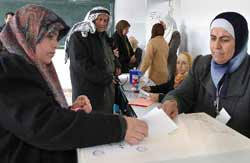
More than 140,000 Palestinians in the West Bank are heading to
26 ballots on Thursday to elect mayors and municipal councils for their towns
and villages. (Xinhua/AFP)
More than 140,000 Palestinians in the West Bank are heading to 26 ballots on
Thursday to elect mayors and municipal councils for their towns and villages.
Palestinian National Authority (PNA) officials said it is the first time
since 1976 that Palestinians in the West Bank go for municipal elections in the
Palestinian territories.
Since then, mayors and municipal councils were nominated either by Israel or
by Palestine Liberation Organization (PLO).
Elections were launched Thursday in 26 local ballots, excluding big
Palestinian cities like Ramallah, Nablus and Hebron. The big cities would start
municipal elections in the second and the third stages.
The second stage of municipal elections for big cities would take place two
weeks later, and the third stage would include the Gaza Strip.
The Palestinian municipal affairs ministry affirmed on Thursday that the
municipal election campaign finished on Wednesday with 886 candidates, including
139 women.
The voting started at 7 a.m. (0500 GMT) Thursday morning.
Ballots would be closed down at 7 p.m. (1700 GMT).
The ministry said in a statement that vote counting would take three hours
and the results of the elections would be declared on Saturday morning in a news
conference by Minister of Municipal Affairs Jamal Shoubaki.
Israel had approved the redeployment of 1,000 Palestinian police officers
around the election centers in the West Bank to guarantee security and prevent
any violence that might take place.
PLO chief Mahmoud Abbas said the municipal elections were the beginning of a
comprehensive national plan to renew the legitimacy of the PNA.
The municipal elections "are part of a comprehensive national plan to renew
the legitimacy through ballots," Abbas said in a statement Thursday.
He called on the Palestinians to elect their municipal councils by vote in
order to "promote democracy and law through their complete participation in it."
"We hope that we will see soon the flag of an independent Palestinian state
flattering on the fences of occupied Jerusalem's mosques and churches," said
Abbas.
Abbas said holding elections was decided by late Palestinian leader Yasser
Arafat in his speech at the Palestinian Legislative Council (PLC) four months
ago. Arafat died on Nov. 11.
"Real democracy and freedom begin with ending the occupation and the Israeli
withdrawal from the Palestinian territories occupied in 1967 and the resumption
of the peace process to reach a permanent peaceful solution," Abbas said.
Meanwhile, the Islamic resistance movement Hamas announced Thursday that it
would participate in the municipal elections.
"Hamas movement strongly supports a comprehensive change," the movement said
in a statement sent to reporters.
Holding municipal elections in three stages in the West Bank and Gaza had
been criticized by some Palestinian factions, in particular Hamas, which sees
there is no justification for holding it on stages.
The ministry of municipal affairs said the reason behind dividing the
municipal elections into stages "is due to the Israeli army security measures
imposed on the Palestinian territories, mainly the sieges and closures."
Thursday morning, Palestinian Prime Minister Ahmed Qurei visited the Abu Deis
town closed to Jerusalem and cast his vote for the municipal elections.
After voting, Qurei told reporters that the elections "are the choice of the
people and an evidence for the non centralization to rule the life of the
Palestinian people on democratic basis."
"The success of the municipal elections would be a test for the success of
presidential and legislative elections that would be held in the Palestinian
territories," said Qurei.
Asked about Hamas participation, Qurei said that the Palestinian Authority
"welcomes the participation of Hamas movement in the municipal elections or any
other elections."



